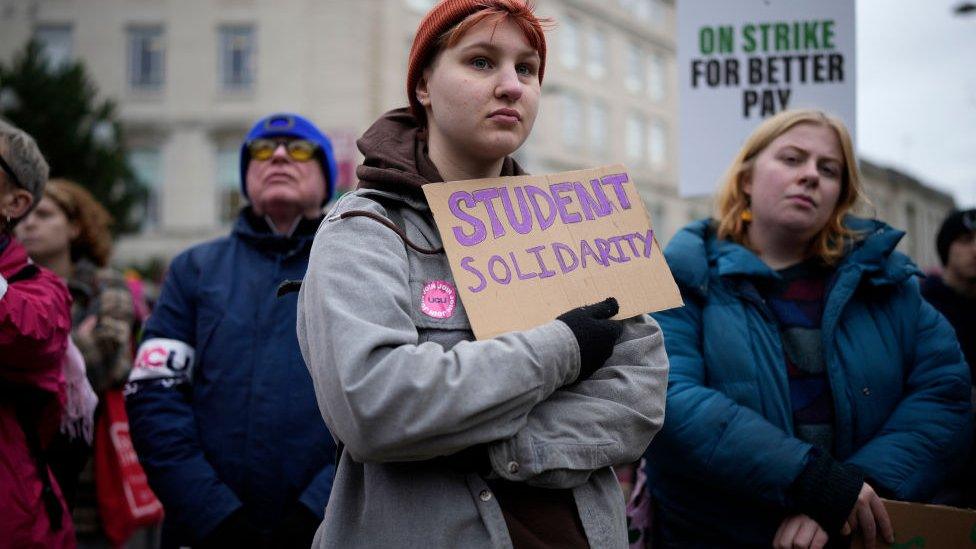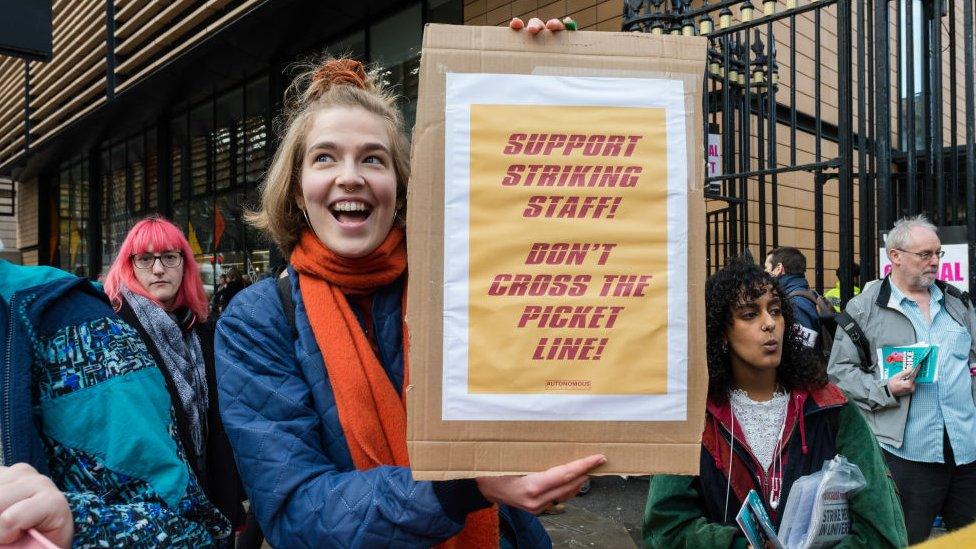Cardiff student may find out grades after graduation
- Published

Eve Davies wonders what the point is in a graduation ceremony for her
A marking and assessment boycott means some final-year students face the prospect of having graduation ceremonies before final degree grades.
Cardiff University student Eve Davies, 22, said her marks could arrive in September, despite graduation in July.
The university said it regretted that the boycott was causing uncertainty for students.
The action by UCU union members follows a UK-wide dispute over pay and conditions.
It began on 20 April and will continue until employers make an improved offer on pay and conditions, a spokesperson said.
An offer of between 5% and 8% has been made, while a poll of universities found about 10% of students will be affected by the boycott.
Eve's three years studying English literature have been marred by disruption, from Covid-19 in her first couple of years to a fresh wave of strikes in her final year.
"Most of my degree obviously was delivered online through blended learning, so it was all very much you had to get on and do the work yourself.
"The lectures were uploaded, you had to figure out your schedule for when you'd get through them and then join a Zoom call for your seminars," she said.
She believes strikes in her second semester meant she had about half the teaching she should have.
Now, on top of this, she faces not knowing her final degree grade until after the summer.
"All we've heard is that our marks will not be released until 1 September, they've put that forward as a provisional date and our graduation ceremonies will still go ahead in July whether we have our marks by then or not," Eve said.
"It's particularly affected how I feel about graduation, obviously that's a ceremony that you really look forward to and I was really looking forward to it. But without knowing my marks by then, I feel like what's the point in graduating?"

Are graduations set to be affected by the marking boycott?
The boycott has also left Eve nervous about a course she is due to start on 25 September.
"I'm also going on to postgraduate study, I've got a conditional offer for that so it would just be nice to know that I have the marks there," she said.
She said she understood why lecturers were taking industrial action, but wished a resolution could be found quickly.
University unions have been striking over casual contracts, pay and workloads since 2019.

Dr Lowthian believes lecturers deserve more of a pay rise
Dr Emily Lowthian, a lecturer in education at Swansea University, said conditions had worsened over her time in the sector.
Before getting a permanent lectureship, Dr Lowthian was on a variety of short-term contracts ranging from seven months to two years.
She said she was struggling to make ends meet due to the cost-of-living crisis.
"With the cost-of-living crisis, what my wage does now is actually nothing compared to what it would have done for people in 2009, so for me I'm really struggling to get on to the housing market," she added.
Dr Lowthian said her pay would be reduced by 50% while taking place in the marking boycott, which she said was disproportionate, adding: "We don't feel valued."

Some students have supported staff on the picket lines
Chief executive of employment association the Universities and Colleges Employers Association, external Raj Jethwa said employers recognised the cost-of-living pressures university staff were facing, but finances were stretched.
"The [pay] offer was at the very top of what the sector could afford back when we made it in February and many institutions have had to defer that uplift because they're financially stretched," he said.
He said institutions believed it was a "reasonable pay uplift" in the circumstances.
However, Dr Andy Williams, the media spokesperson for the Cardiff UCU branch, said he believed the money is there.
"Our working conditions are our students' learning conditions and you can't have excellent learning opportunities for students in world class universities when you are short-changing your staff the way they have with us over the last decade," he said.
Both Cardiff and Swansea universities said this was a national dispute and could not be resolved independently by them, and that they legally reserved the right to withhold pay for partial performance of duties.
In a statement, Swansea University said: "We are doing all we can to mitigate the impact of this action on our students, and we are committed at all times to upholding the standard of our awards and the quality of the education we provide.
"Locally we have good relations with the campus trades unions and are committed to remaining in regular dialogue with the UCU during the current dispute."
A Cardiff University spokesperson said it regretted the marking and assessment boycott is causing uncertainty for students.
- Published20 October 2023

- Published20 April 2023
